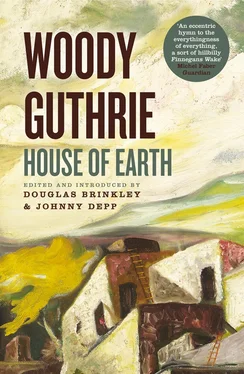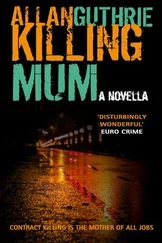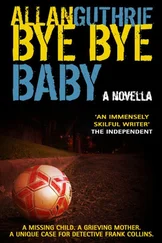While Guthrie was himself a common man, he was uncommon in his efforts to celebrate the proletariat in his art. He hoped someday Americans could learn how to abolish the laws of debt and repayment. Guthrie wanted to be heard, to count for something. He demanded that his political beliefs be acknowledged, respected, and treated with dignity. As his graphic love scenes demonstrate, he wasn’t scared of anyone. He had no fear. He lived his art. In short, Guthrie inspired not only people of his time, but people of later times enraged by injustice, yearning for truth, searching for that elusive resolution of class inequality.
We consider the publication of House of Earth an integral part of the celebration of the centennial of Woody Guthrie’s birth, a significant cultural event, and a major installment in the corpus of his published work. He wrote the novel as a side project; it was never the focus of his intrepid life of performing his songs from coast to coast. Yet the novel’s intensity guarantees it a place in the ever-growing field of Guthrieana. When we shared Guthrie’s House of Earth with Bob Dylan, he said he was “surprised by the genius” of the engaging prose, a realistic meditation about how poor people search for love and meaning in a corrupt world where the rich have lost their moral compass.
The discovery of House of Earth reinforces Guthrie’s place among the immortal figures of American letters. Guthrie endures as the soul of rural American folk culture in the twentieth century. His music is the soil. His words—lyrics, memoirs, essays, and now fiction—are the adobe bricks. He is of the people, by the people, for the people. Long may his truth be heard by all those who care to listen, all those with hope in their heart and strength in their stride. Guthrie’s proletariat-troubadour legacy is profoundly human, and his work should be forever celebrated. As Steinbeck wrote in tribute, “Woody is just Woody. Thousands of people do not know he has any other name. He is just a voice and a guitar. He sings the songs of a people and I suspect that he is, in a way, that people. Harsh voiced and nasal, his guitar hanging like a tire iron on a rusty rim, there is nothing sweet about Woody, and there is nothing sweet about the songs he sings. But there is something more important for those who still listen. There is the will of a people to endure and fight against oppression. I think we call this the American spirit.”
Douglas Brinkley and Johnny Depp
Albuquerque, New Mexico
The wind of the upper flat plains sung a high lonesome song down across the blades of the dry iron grass. Loose things moved in the wind but the dust lay close to the ground.
It was a clear day. A blue sky. A few puffy, white-looking thunderclouds dragged their shadows like dark sheets across the flat Cap Rock country. The Cap Rock is that big high, crooked cliff of limestone, sandrock, marble, and flint that divides the lower west Texas plains from the upper north panhandle plains. The canyons, dry wash rivers, sandy creek beds, ditches, and gullies that joined up with the Cap Rock cliff form the graveyard of past Indian civilizations, flying and testing grounds of herds of leather-winged bats, drying grounds of monster-size bones and teeth, roosting, nesting, and the breeding place of the bald-headed big brown eagle. Dens of rattlesnakes, lizards, scorpions, spiders, jackrabbit, cottontail, ants, horny butterfly, horned toad, and stinging winds and seasons. These things all were born of the Cap Rock cliff and it was alive and moving with all these and with the mummy skeletons of early settlers of all colors. A world close to the sun, closer to the wind, the cloudbursts, floods, gumbo muds, the dry and dusty things that lose their footing in this world, and blow, and roll, jump wire fences, like the tumbleweed, and take their last earthly leap in the north wind out and down, off the upper north plains, and down onto the sandier cotton plains that commence to take shape west of Clarendon.
A world of big stone twelve-room houses, ten-room wood houses, and a world of shack houses. There are more of the saggy, rotting shack houses than of the nicer wood houses, and the shack houses all look to the larger houses and curse out at them, howl, cry, and ask questions about the rot, the filth, the hurt, the misery, the decay of land and of families. All kinds of fights break out between the smaller houses, the shacks, and the larger houses. And this goes for the town where the houses lean around on one another, and for the farms and ranch lands where the wind sports high, wide, and handsome, and the houses lay far apart. All down across this the wind blows. And the people work hard when the wind blows, and they fight even harder when the wind blows, and this is the canyon womb, the stickery bed, the flat pallet on the floor of the earth where the wind its own self was born.
The rocky lands around the Cap Rock cliff are mostly worn slick from suicide things blowing over it. The cliff itself, canyons that run into it, are banks of clay and layers of sand, deposits of gravel and flint rocks, sandstone, volcanic mixtures of dried-out lavas, and in some places the cliff wears a wig of nice iron grass that lures some buffalo, antelope, or beef steer out for a little bit, then slips out from underfoot, and sends more flesh and blood to the flies and the buzzards, more hot meals down the cliff to the white fangs of the coyote, the lobo, the opossum, coon, and skunk.
Old Grandpa Hamlin dug a cellar for his woman to keep her from the weather and the men. He dug it one half of one mile from the rim of Cap Rock cliff. He loved Della as much as he loved his land. He raised five of his boys and girls in the dugout. They built a yellow six-room house a few yards from the cellar. Four more children came in this yellow six-room house, and he took all of his children several trips down along the cliff rim, and pointed to the sky and said to them, “Them same two old eagles flyin’ an’ circlin’ yonder, they was circlin’ there on th’ mornin’ that I commenced to dig my dugout, an’ no matter what hits you, kids, or no matter what happens to you, don’t git hurried, don’t git worried, ’cause the same two eagles will see us all come an’ see us all go.”
And Grandma Della Hamlin told them, “Get a hold of a piece of earth for yerself. Get a hold of it like this. And then fight. Fight to hold on to it like this. Wood rots. Wood decays. This ain’t th’ country to get a hold of nothin’ made out of wood in. This ain’t th’ country of trees. This ain’t even a country fer brush, ner even fer bushes. In this streak of th’ land here you can’t fight much to hold on to what’s wood, ’cause th’ wind an’ th’ sun, an’ th’ weather here’s just too awful hard on wood. You can’t fight your best unless you got your two feet on th’ earth, an’ fightin’ fer what’s made out of th’ earth.” And walking along the road that ran from the Cap Rock back to the home place, she would tell them, “My worst pain’s always been we didn’t raise up a house of earth ’stead of a house of wood. Our old dugout it was earth and it’s outlived a hundred wood houses.”
Still, the children one by one got married and moved apart. Grandma and Grandpa Hamlin could stand on the front porch of their old home place and see seven houses of their sons and daughters. Two had left the plains. One son moved to California to grow walnuts. A daughter moved to Joplin to live with a lead and zinc miner. Rocking back and forth in her chair on the porch, Della would say, “Hurts me, soul an’ body, to look out acrost here an’ see of my kinds a-livin’ in those old wood houses.” And Pa would smoke his pipe and watch the sun go down and say, “Don’t fret so much about ’em, Del, they just take th’ easy way. Cain’t see thirty years ahead of their noses.”
Читать дальше











